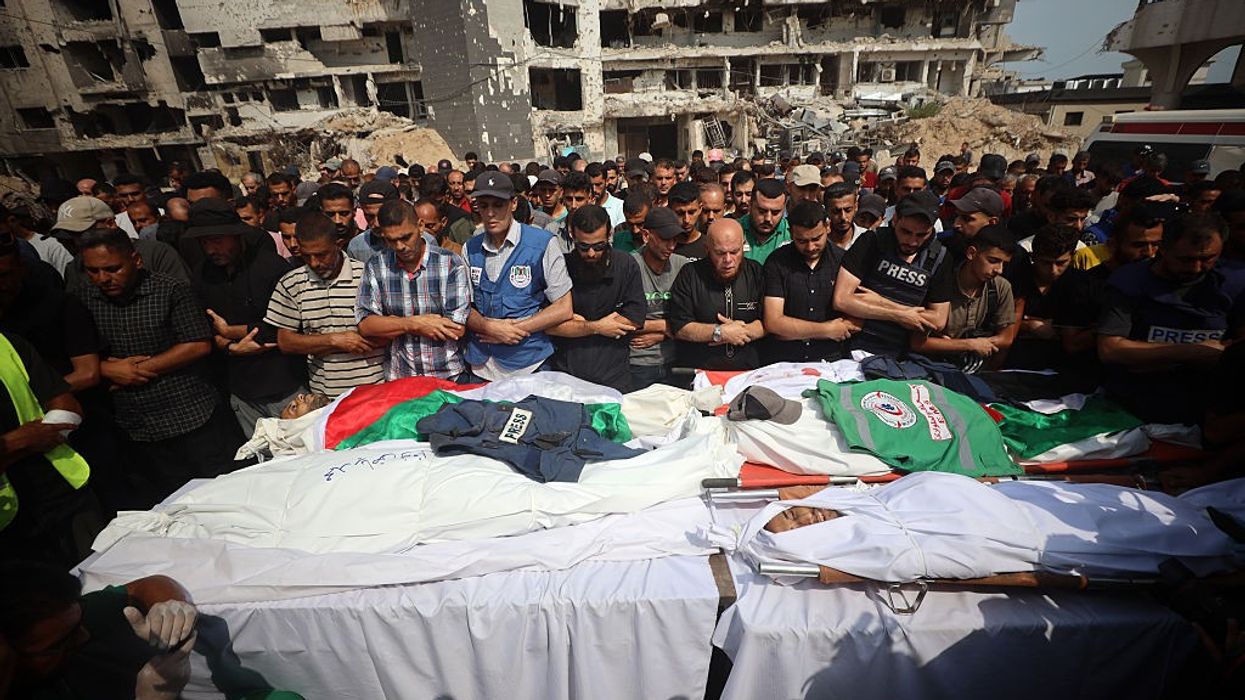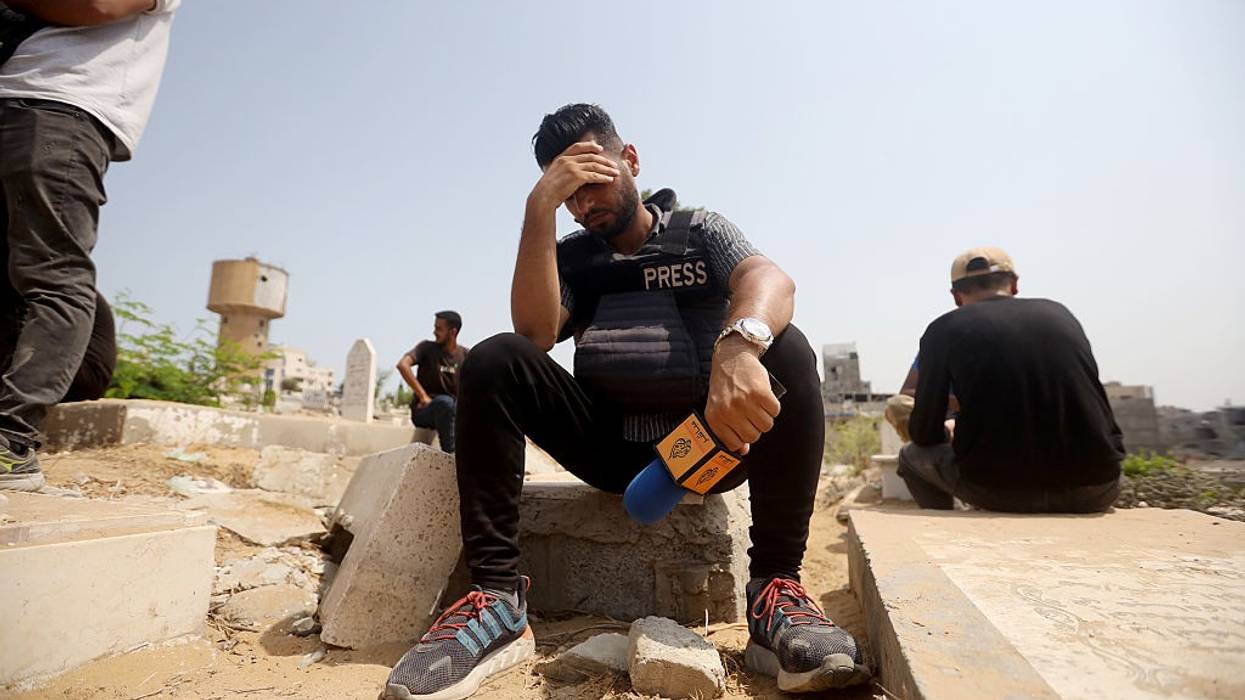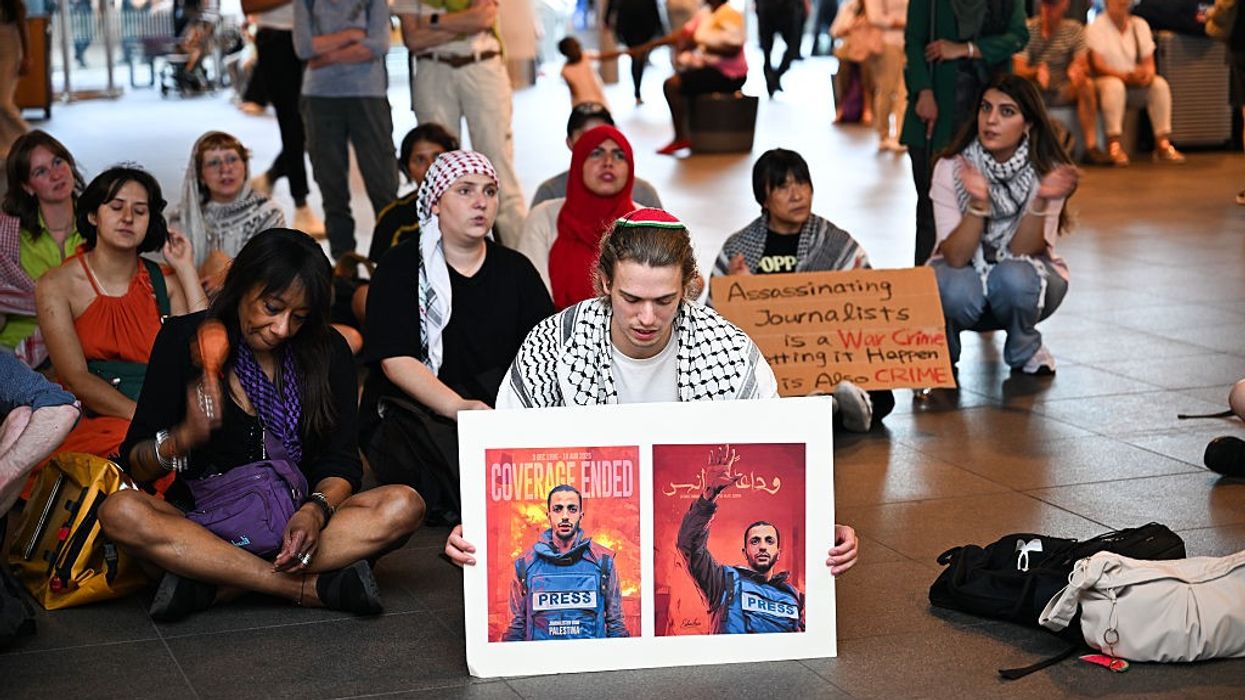Inside the tent sat Anas al-Sharif, Mohammed Qreiqeh, Ibrahim Zaher, Mohammed Noufal, and Moamen Aliwa. Minutes later, an Israeli missile struck the tent. The Israeli military admitted targeting the site, alleging al-Sharif was a Hamas cell leader. No independent evidence has confirmed that claim. Al Jazeera stated that this was a targeted assassination.
The blast did more than tear through canvas and steel. It silenced the final independent voices still reporting from Gaza City. When you kill the witness, you kill the story. And when the story dies, accountability dies with it. This was not an isolated tragedy. It was part of a pattern that, measured across the war, has made Gaza the deadliest place on Earth for journalists in the modern record.
The deliberate killing of multiple journalists from a single, reputable newsroom is not without precedent. Each time it happens, it marks a rupture in the global record. In 1975, the Balibo Five were executed in East Timor to prevent them from reporting on Indonesia’s invasion. In 2009, the Maguindanao Massacre claimed 32 reporters in the Philippines, the largest single-day killing of journalists in history, as a warning to all who might challenge local power. In 2012, American correspondent Marie Colvin was killed when Syrian forces shelled a known media center in Homs. In Nazi Germany and under Stalin’s Soviet Union, many journalists were imprisoned, exiled, or executed for defying the state narrative, their deaths folded into broader purges and wartime atrocities. The tent strike in Gaza now stands in this grim lineage, a calculated act to silence witnesses and send a message to the world that there are places you will not be allowed to see.
The Deadliest Conflict for Journalists
The Committee to Protect Journalists (CPJ) reports at least 192 journalist deaths since October 7, 2023: 184 Palestinian, 2 Israeli, and 6 Lebanese, as of August 11, 2025. The International Federation of Journalists (IFJ) counts at least 195 media workers killed. Gaza’s Government Media Office claims 238, while the Costs of War Project at Brown University documents about 232 through late March 2025. These totals vary depending on whether the counts include foreign correspondents, media support staff, or missing journalists presumed dead.
Even the lowest confirmed total makes this the deadliest conflict for journalists in CPJ’s record, surpassing all others in speed and density of loss. From October 7, 2023, through August 11, 2025, an average of about 8 to 9 journalists per month have been killed, totaling 192 deaths. For comparison, during the entire U.S. war in Iraq, which lasted more than eight years, CPJ recorded 204 journalists and media workers killed. Both figures are from CPJ’s database, using the same definitions for journalists and media workers. Each number is a human being with a family, colleagues, and a record of truths that now stops mid-sentence. The IFJ estimates that more than 10% of Gaza’s entire journalist corps has been killed.
Such a pattern does not happen by accident. The scale and pace of these deaths suggest an intentional effort to remove those who can create an independent record of the war.
Erasing the Record
The first casualty is often the truth. In Gaza, it is the truth tellers. These deaths are not the inevitable byproduct of a chaotic battlefield. They result from deliberate decisions to remove those most capable of documenting events and holding perpetrators to account.
The pattern is well known: Eliminate independent eyes, leaving only the account sanctioned by those in power, seal off the site, and eliminate evidence until only the official version remains. This is not only about shaping opinion in the moment. In war crimes tribunals, journalistic photographs, videos, and testimonies have been used as evidence, making those who capture them a direct threat to impunity. United Nations Special Rapporteur Irene Khan has said that attacks on journalists fit into a global pattern of repression that undermines democracy. In Gaza, this sequence is already well underway.
If those with the cameras are gone, who decides what the rest of us see?
The press corps’ decimation forms the outer wall of a larger project. Human rights groups warn that this campaign seeks the political and demographic erasure of the 5.4 million Palestinians in Gaza and the West Bank, with displacement, imprisonment, and disenfranchisement on a mass scale. The methods are familiar: trap communities in “no exit” zones, dismantle life-sustaining infrastructure, close borders, and silence those who can bear witness. History shows that when the heart of a people is targeted, the tremors do not stop at its borders. They move outward, altering the lives of kin and communities far beyond the place where the attack began.
History shows what follows when the witnesses are gone. In the Balkans, in Syria, in Myanmar, the absence of independent eyes allowed perpetrators to dictate the record and insist their version was the only truth.
Why Silencing Comes First
The strike on the al-Shifa tent happened before the last neighborhoods went quiet. In wars where mass displacement or worse is contemplated, silencing independent reporting is often an early operational step. Sarajevo’s television studios were shelled into darkness. In Aleppo, journalists were hunted through the rubble. In Myanmar, reporters documenting the Rohingya crisis were jailed or killed.
The reason rarely changes: Without witnesses, atrocities can be denied, timelines rewritten, and casualty counts reduced to rumor. In that vacuum, truth becomes whatever those in power decide it should be. If those with the cameras are gone, who decides what the rest of us see?
The elimination of journalists is not only about restricting information. It is about shaping the emotional terrain of the conflict. Each killing sends a message to the surviving press that they are not protected and that their work makes them targets. This is psychological warfare, aimed not just at reporters but at the public they serve. When people see that even clearly marked press are attacked, they understand that there is no neutral ground, no shield of visibility.
As more journalists are driven out or silenced, fewer remain to challenge official accounts, leaving entire populations dependent on information filtered through those in power. In Latin America’s “Dirty Wars,” in Sri Lanka’s civil war, and in the Philippines under President Ferdinand Marcos, such tactics were designed to suppress the will to resist by convincing whole communities that their suffering would never be witnessed, much less believed. Gaza’s blackout is not only the removal of documentation; it is the removal of hope that anyone will ever hear the truth.
The United States Is Learning and Exporting the Script
The same blueprint used to silence the press abroad is already finding footholds within U.S. borders. The United States operates over 200 Immigration and Customs Enforcement (ICE) detention facilities, many with the regimentation and secrecy of military compounds. Policy proposals from the current administration and its allies call for mass deportations, an executive order to curtail birthright citizenship that is now blocked in court, and expansion of detention capacity on military bases.
Journalists who have investigated ICE activities, including deportation operations, workplace raids, and conditions inside its facilities, have frequently faced barriers. Reporters have been denied access, threatened with legal action, or physically removed while trying to document these operations. Some have been blocked from speaking with detainees, filming at detention sites, or covering ICE enforcement actions in the community. CPJ Executive Director Jodie Ginsberg has said that keeping journalists out keeps the truth out. The language used to justify these restrictions, portraying detainees as criminals, threats, or “invaders,” is identical to that used elsewhere to prepare the ground for repression.
What is refined in one arena, whether a detention camp, a protest site, or a conflict zone, does not remain there.
Every time this script is run abroad, it becomes easier to perform at home. This is not hypothetical. At Standing Rock, reporters were arrested and equipment seized. In 2020, journalists covering protests after the murder of George Floyd were injured by rubber bullets, exposed to tear gas, and detained. These incidents limited what the public could see in real time and in some cases allowed authorities to control the only surviving footage or accounts. The method is the same as in other crackdowns: Control the people by controlling what can be seen and said.
The United States is not alone. India has stripped citizenship from Muslims in Assam. Hungary has throttled independent media through legal and regulatory pressure. Egypt detains and silences journalists as a matter of policy. In each case, independent reporting was crippled before mass arrests, disenfranchisement, or expulsions took place. The success of such methods in one state emboldens others to replicate them, creating a cycle in which press repression becomes both normalized and exportable. What is refined in one arena, whether a detention camp, a protest site, or a conflict zone, does not remain there. It is studied, shared, and deployed wherever those in power fear scrutiny.
The Predictable Defenses
When the press is killed or silenced, officials often say that war is dangerous and journalists accept the risks. The Geneva Conventions, however, make clear that journalists are civilians who are entitled to protection and that danger does not permit targeting them. Another common defense is to claim that those killed were militants posing as reporters, a label that, once applied, erases legal protections. In Gaza, no independent body has verified the accusations against Anas al-Sharif or his colleagues.
Some insist that Gaza is unique, avoiding comparisons to other situations where states control movement, limit oversight, and erase populations from public life. Others dismiss historical parallels as exaggeration, ignoring that forced displacement, legal nullification, and the silencing of witnesses have long been precursors to atrocities. When criticism of Israeli policy is labeled antisemitic, governance is conflated with identity, and legitimate scrutiny is deflected.
Jewish journalists and Israeli human rights advocates have also criticized these policies, underscoring that opposition is not rooted in prejudice. The rhetoric that frames such criticism as antisemitic is part of the machinery of repression, conditioning the public to excuse the killings and accept the absence of independent reporting.
The Fight for Witnesses
The missile that hit Al Jazeera’s tent targeted more than five people; it struck at the principle that the public has a right to know and at the belief that truth should outlive the men and women who report it.
If every image, every report, and every interview were filtered through those with something to hide, how would you know what happened? Imagine it is your city where the cameras have gone dark. That a protest you joined, a police raid in your neighborhood, or a natural disaster in your community is unfolding, and the only images that will survive are the ones the authorities approve. Imagine knowing that the people documenting the truth are being hunted, and that without them, your story will vanish into an official silence polished to look like fact.
This is not a thought experiment. The tools and tactics now used against journalists in Gaza, from mass surveillance to targeted suppression, are already here, in our cities, at our borders, in our public spaces. The question is not if they could be turned inward, but when, and against whom.
For Americans who think they are insulated from this logic, the warning is blunt: The systems refined in Gaza do not stay there.
If Gaza’s press corps can be eliminated so quickly while the world looks away, then no war zone, no protest, and no detention center is safe from the same erasure. That is how it starts. You eliminate independent eyes, leave only the account sanctioned by those in power, and then rewrite the story as if they never existed.
To defend journalists is to defend the archive of truth itself, the evidence from which any hope of justice must be built. Without that record, there is only the official version, changed at will, designed to serve those in power. For Americans who think they are insulated from this logic, the warning is blunt: The systems refined in Gaza do not stay there. They adapt. They travel. They are deployed wherever those in power fear exposure.
You can push back. Support independent and at-risk journalists through organizations like the Committee to Protect Journalists, Reporters Without Borders, or local press freedom funds. Demand that your representatives back enforceable protections for journalists at home and abroad. Share the work of those risking their lives to report from Gaza and other conflict zones. Your advocacy, funding, and amplification are part of the fragile chain that keeps future atrocities from being erased.
The press tent outside al-Shifa was a small, temporary structure. The idea behind its destruction was neither small nor temporary. Unless the witness is defended everywhere, we may find no one left to tell our story when it matters most.



